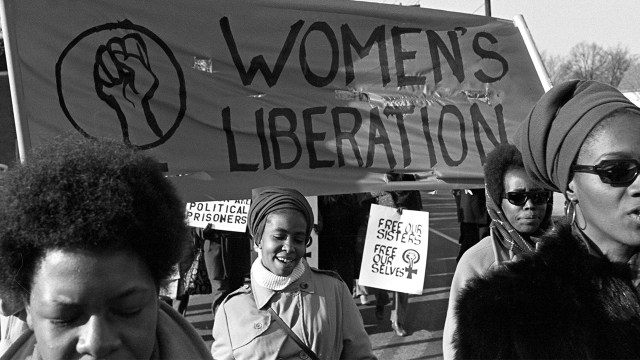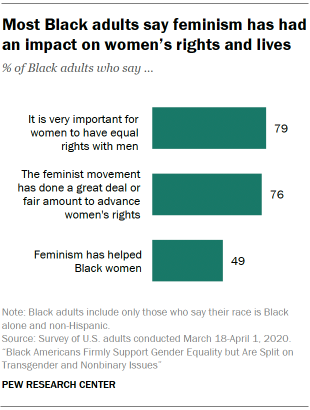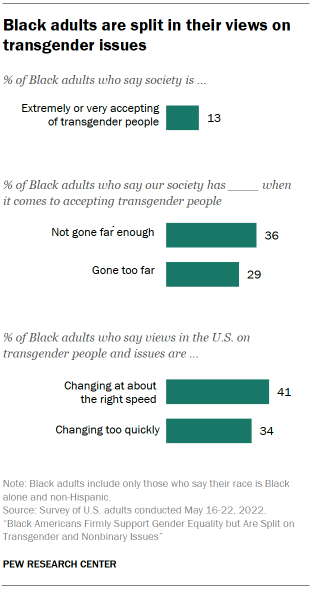Nearly six-in-ten want organizations working for Black progress to address the distinct challenges facing Black LGBTQ people

In recent years, Pew Research Center has conducted multiple studies that focus on gender and gender identity. This analysis of Black Americans’ views on gender equality, gender roles, feminism, and transgender and nonbinary issues relies on data from four of these focused surveys.
The first was conducted among 8,660 Black adults (ages 18 and older) from Nov. 19, 2019, to June 3, 2020. It contains data from four sources: Pew Research Center’s American Trends Panel (conducted online), NORC’s AmeriSpeak panel (conducted online or by phone), Ipsos’ KnowledgePanel (conducted online) and a national cross-sectional survey by the Center (conducted online and by mail). This survey provided the data on Black adults’ views on gender, faith and family discussed in this report. For more information on this study, see its methodology and questionnaire.
The second was conducted online among 3,143 U.S. adults (ages 18 and older) from March 18 to April 1, 2020, on Ipsos’ KnowledgePanel. There were 705 Black adults in the sample. This survey provided the data on the public’s views of gender equality and feminism discussed in this report. For more information on this study, see its methodology and questionnaire.
The third survey was conducted online among 3,912 Black adults (ages 18 and older) from Oct. 4 to 17, 2021. The survey includes 1,025 Black adults on the Center’s American Trends Panel and 2,887 Black adults on Ipsos’ KnowledgePanel. This survey provided the data on Black adults’ views of intersectional issues and their concerns about discrimination against LGBTQ people. For more information on this study, see its methodology and questionnaire.
The fourth survey was conducted online among 10,188 U.S. adults (ages 18 and older) from May 16 to 22, 2022, using the Center’s American Trends Panel. There were 799 Black adults in the sample. This survey provided the data on the public’s views of transgender and nonbinary issues discussed in this report. For more information on this study, see its methodology and questionnaire. Read more on how we measured the share of the U.S. population that is transgender or nonbinary.
Respondents in each study were recruited through national, random sampling of residential addresses. Recruiting panelists by mail ensures that nearly all U.S. adults have a chance of selection. This gives us confidence that any sample can represent the whole population (see our Methods 101 explainer on random sampling).
The terms “Black Americans,” “Black adults” and “Black people” are used interchangeably throughout this report to refer to U.S. adults who self-identify as Black. These terms refer to Black adults who are single-race Black and say they have no Hispanic background, unless otherwise noted.
Throughout this report, educational descriptors are shortened to denote the following: “High school or less” indicates Black adults who have obtained a high school diploma or lower level of education, and “some college experience” or “with college experience” indicate Black adults who either attended college and obtained an associate degree but not a bachelor’s degree, or who attended college without obtaining any degree.
The acronym “LGBTQ” collectively refers to people who are lesbian, gay, bisexual, transgender or queer.
The term “transgender” is used here to refer to people whose gender is different from the sex they were assigned at birth. This includes, but is not limited to, transgender men (that is, men who were assigned female at birth) and transgender women (women who were assigned male at birth).
The term “nonbinary” refers to people who are neither a man nor a woman or who aren’t strictly one or the other. Some, but not all, nonbinary participants also consider themselves to be transgender. Read more on how we measured the share of the U.S. population that is transgender or nonbinary.
The phrase “gender equality” is used throughout this report to refer to the extent to which women and men have equal rights, opportunities and access to resources in the United States.

Discussions about gender equality and feminism have a long history among Black Americans. Some hallmarks of this history are Maria Miller Stewart publicly affirming the place of Black women as abolitionist leaders in Boston in 1832; the Combahee River Collective’s formative statement on the intersection of race, gender, class and sexuality in 1977; Anita Hill’s sexual harassment allegations against then-Supreme Court nominee Clarence Thomas in 1991; and the ongoing discussions about how women are represented in rap music, both as subjects and performers of songs. These often-contentious debates raise questions about the relative importance of gender and other inequalities among Black Americans, given the long history of racial inequality in the United States.
To be sure, about six-in-ten non-Hispanic Black adults1 (62%) say Black people should prioritize the struggle against racism over other inequalities, according to a 2021 Pew Research Center survey of Black adults. Meanwhile, three-in-ten Black adults say the opposite: that racism should not be prioritized over other inequalities. Among the 30% who say racism should not be prioritized, most say this is because racism is just as important as other inequalities or that racism is interconnected with other inequalities.
Although most Black Americans view the fight against racism as their primary struggle for progress, they also support women’s equality and think feminism has been a positive force for women overall and for Black women specifically, according to a 2020 Pew Research Center survey of U.S. adults.
About eight-in-ten non-Hispanic Black adults say it is very important for women to have equal rights with men (79%). The majority of Black adults (76%) also say the feminist movement has done a great deal or a fair amount to advance women’s rights. And about half of Black adults say feminism has helped Black women (49%).
These findings stand in stark contrast to the contentious history that Black Americans have had with the feminist movement. Black women were relegated to the back of feminist marches in the 19th century, if not completely excluded. Black women redefined their approach to women’s equality, and even renamed it “womanism” to make it more inclusive of their needs and to reject the exclusion they had experienced in feminist organizations.
This history provides context for the findings of the 2020 survey, which indicate that about two-thirds (68%) of Black adults view feminism as empowering, but nearly half (48%) would not use the term “feminist” to describe themselves.
Black adults are split over how much society should accept transgender people
According to the Williams Institute, at least 1 million Black adults in the U.S. are lesbian, gay, bisexual or transgender (LGBT), making up 12% of the nation’s LGBT population. LGBT Black Americans are younger than non-LGBT Black adults, with nearly 60% under age 35 compared with 34% of non-LGBT Black adults. Women comprise a larger share of LGBT Black adults than of non-LGBT Black adults, and LGBT Black adults are slightly less likely to live in the South than the rest of the Black population.
Black LGBT and non-LGBT adults do not differ in their sense of belonging to their own race. Nearly half of both groups say they feel connected to Black communities. And 62% of Black lesbian, gay or bisexual adults and 29% of Black transgender adults say they feel a part of the larger LGBT community, the Williams Institute has found.

Still, over half of Black LGBT adults (55%) say the city or area they live in is not a good place for transgender people, and 39% say their areas are not safe for lesbian, gay or bisexual people. In fact, the majority of Black LGBT people say they have experienced verbal insults or abuse (79%) or have been threatened with violence (60%).
The social difficulties that Black LGBT people experience are reflected in Black Americans’ views on gender identity issues, according to a 2022 Pew Research Center survey of U.S. adults. Only 13% of non-Hispanic Black adults say that U.S. society is extremely or very accepting of transgender people.
However, Black adults are split in their views on how accepting society should be. While 36% say society has not gone far enough in accepting people who are transgender, 31% say the level of acceptance in society has been about right and 29% say it has gone too far. And while about four-in-ten Black adults (41%) say views about transgender people and issues are changing at the right speed, roughly a third (34%) say they are changing too quickly.
These divergent points of view exist alongside each other, demonstrating that Black Americans’ views on gender identity issues show much less consensus than their views on gender equality.
The findings in this report emerge from four Pew Research Center surveys of U.S. adults conducted from 2019 to 2022. Using multiple Center surveys provides a unique opportunity to summarize Black Americans’ views on gender equality and gender identity in the United States in the broadest scope. The report provides context for Black Americans’ views on and experiences with current issues of national importance, such as their majority disapproval of the overturning of Roe v. Wade (67%) and the disproportionate number of Black transgender and nonbinary people who experience fatal violence.
Here are other findings presented in this report:
Black Americans are critical of the progress of women’s equality in the U.S. About seven-in-ten Black adults (69%) say that the U.S. has not gone far enough in giving women equal rights with men. And among those who say this, a quarter say it’s not too or not at all likely that there will be equal rights between women and men in the future.
Black Americans are more likely to have egalitarian views about gender roles than their houses of worship. Black adults believe that mothers and fathers who live in the same household should share parenting (86%) and financial responsibilities (73%). However, the majority of Black Americans who attend religious services at least a few times a year say their congregations are more likely to emphasize men’s financial role in the family and involvement in Black communities as role models than women’s family and community roles.
Black Americans are more likely to know someone who is transgender or nonbinary than to identify as such themselves. About 1.4% of Black adults are transgender or nonbinary. However, 35% of Black adults say they know someone who is transgender. And among those who have heard at least a little about people who do not identify as a man or woman, 26% say they know someone who identifies this way.
CORRECTION (Feb. 27, 2023): In Chapter 3, the chart “Nearly six-in-ten Black adults say Black organizations should address the challenges Black LGBTQ people face,” the rows for women and men have been edited to correct an inversion in the percentages of Black women and Black men who think organizations should address challenges that Black gay and lesbian people face. These figures are 62% and 51%, respectively. These numbers were referenced correctly in the body of the report, and the changes did not affect the report’s substantive findings.




